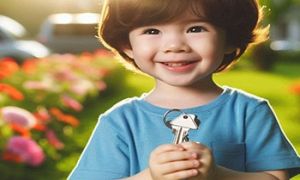

This feelings rhyme is sung in the tune of "I'm A Little Teapot" and is simple for both toddlers and preschoolers. It describes facial features when someone is happy and sad. This is a great song for children to get to understand when someone looks happy or sad.
This song is a fun way for kids to learn how to identify and regulate their emotions. Children will begin to understand that they go through different emotions throughout the day and it's alright to feel what they feel when they feel.
This action song names feelings that children may have. It also includes actions for children to do during the song. This is great for children to name feelings that they may experience.
Relationships with carers play a key role in determining a child’s well-being in the earliest years. They have the potential to impact only impact a child’s emotional and social development but also learning in school and later life outcomes. The following article provides information on Why Relationships Matter, Strategies To Implement When Building Relationships, Stages Of Social Development and more. However, for relationships to be meaningful, interactions need to be warm, caring and responsive.
Time and again, meaningful friendships have been linked to positive life outcomes. However, in early childhood, peer connections become even more important since it is while playing with each other that the most joyful learning happens. The following article provides information on early childhood friendships, their benefits and how educators can support children to develop and maintain them.
Developmental milestones are a set of functional skills or age-specific tasks that most children can do at a certain age range as they grow and develop. The following provides the developmental milestones from 2 months to 5 years old.
Children’s early experiences consist of interactions with parents, other family members, Educators and teachers as well as their environment. Due to the rapid nature of brain development in early childhood, the quality of early experiences deeply impacts their emerging selfhood and how they respond to the world around them for the rest of their life. This can be broadly thought to constitute the core of their social and emotional development and here is how it is linked to the EYLF.
Erik Erikson developed a psychosocial theory to understand how we each develop our identities through eight stages of psychosocial development from infancy to adulthood. The following article provides information on Erikson's Eight Stages, Eriksons Theories In Practice and more.
During this stage, school age children have developed an increasing need of independence and become more socially accepting of peers. Play becomes more complex, with rules being established in group games and games are focused on having a “winning” team or being called the “winner” at the end of a game. Competitiveness begins to emerge as school age children continue to compare themselves with school peers. It is also common at this age, for school age children to have unstable friendships as they start to be unkind towards each other.
At this point preschoolers begin to interact effectively with others. Play becomes more innovative and organized and “boyfriend” or “girlfriend” begins to emerge. Preschoolers have developed an understanding for other’s feelings and become more sensitive. They will also want to be given more responsibility and enjoys helping out with chores... basically at this stage a preschooler is a mini adult.
 As an Educator in Australia, your pay rate falls under the Children’s Services Award 2010. This award states the minimum amount that an employer can… Read More
As an Educator in Australia, your pay rate falls under the Children’s Services Award 2010. This award states the minimum amount that an employer can… Read More
 When working as a qualified Early Childhood Teacher (with a university degree) within a service, your rate of pay will come from the Educational Services… Read More
When working as a qualified Early Childhood Teacher (with a university degree) within a service, your rate of pay will come from the Educational Services… Read More
 When working as a Diploma Qualified Educator your pay rate is from the Children's Services Award 2010. This Award states your minimum rate of pay… Read More
When working as a Diploma Qualified Educator your pay rate is from the Children's Services Award 2010. This Award states your minimum rate of pay… Read More
 When working as a Cert 3 Qualified Educator, your pay rate is from the Children's Services Award 2010. This Award states your minimum rate of… Read More
When working as a Cert 3 Qualified Educator, your pay rate is from the Children's Services Award 2010. This Award states your minimum rate of… Read More
 Educational Leaders play a crucial role in their early childhood service by ensuring that the educational program aligns with best practices and supports the holistic… Read More
Educational Leaders play a crucial role in their early childhood service by ensuring that the educational program aligns with best practices and supports the holistic… Read More
 In early childhood education and care, ratios are more than a technicality—they are a frontline safeguard. Every child deserves responsive supervision, emotional connection, and developmental… Read More
In early childhood education and care, ratios are more than a technicality—they are a frontline safeguard. Every child deserves responsive supervision, emotional connection, and developmental… Read More
 With the new national child safety reforms kicking in on 1 September 2025, early childhood services like yours have a real opportunity to lead the… Read More
With the new national child safety reforms kicking in on 1 September 2025, early childhood services like yours have a real opportunity to lead the… Read More
 Here’s a comprehensive Mobile Phone and Smart Watch Policy tailored for early childhood education and care (ECEC) services in Australia, aligned with the latest 2025… Read More
Here’s a comprehensive Mobile Phone and Smart Watch Policy tailored for early childhood education and care (ECEC) services in Australia, aligned with the latest 2025… Read More
 The Sea of Fish Challenge is a national initiative that invites children, educators, families, and communities to create and display fish artworks as a symbol… Read More
The Sea of Fish Challenge is a national initiative that invites children, educators, families, and communities to create and display fish artworks as a symbol… Read More
 Across the early childhood education and care sector, educators are sounding the alarm: current staffing ratios are insufficient to deliver safe, meaningful, and developmentally appropriate… Read More
Across the early childhood education and care sector, educators are sounding the alarm: current staffing ratios are insufficient to deliver safe, meaningful, and developmentally appropriate… Read More

In the wake of disturbing child abuse allegations at a Melbourne early learning centre, families...
See more...
Quality Area 2 focuses on children's health and safety within educational and care settings, as...
See more...
Sometimes you know that it’s time to move on from your current centre. You may...
See more...© 2009-2025 Aussie Childcare Network Pty Ltd. All Rights Reserved.

